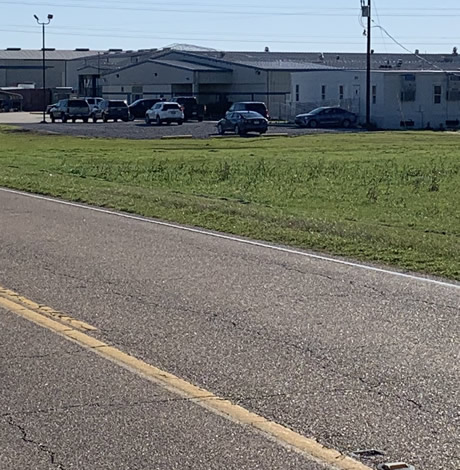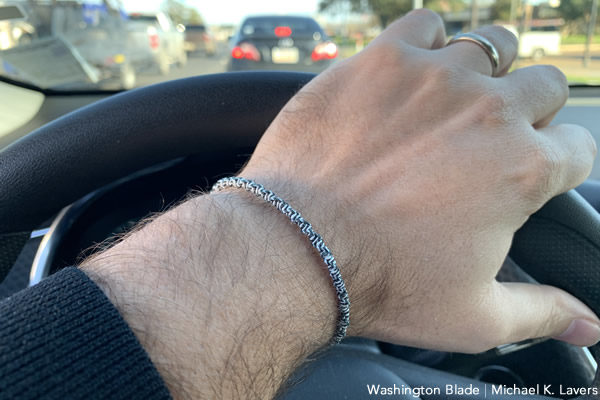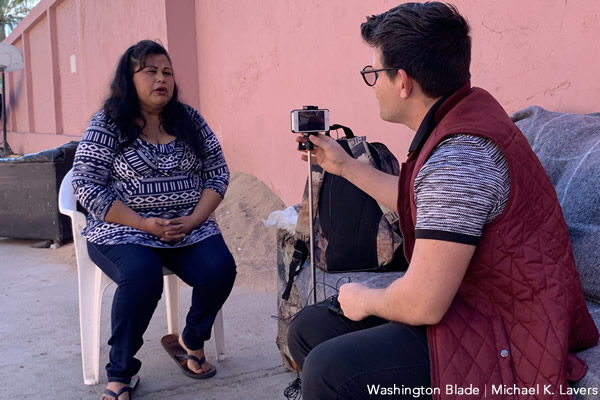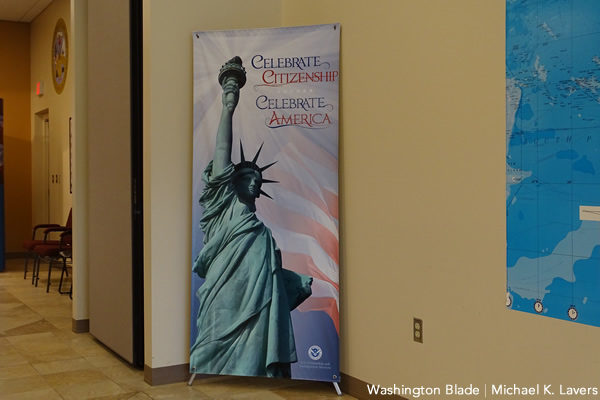Opinions
My afternoon with Yariel


FERRIDAY, La. — It was shortly after 1 p.m. on Saturday when a male guard at the River Correctional Center, a privately-run facility in Louisiana’s rural Concordia Parish, brought me into the visitor’s room. I sat down at a long school cafeteria-style table and glanced at the self-empowerment murals that had been painted onto the wall. A couple of minutes later I looked over to a door with a small window in it and saw Yariel, who was wearing a green striped jumpsuit. Another male guard opened the door and Yariel entered the room. Within a couple of seconds, we were hugging each other tightly. I was nearly sobbing, but he assured me it was ok. After a couple of minutes, we sat down at the table — across from each other — and our visit began. I used one of the napkins that I took from a nearby gas station when I stopped there to use the restroom to wipe the tears from my eyes. A couple of minutes later I placed his hands into mine and he began to cry. I gave him one of the gas station napkins to wipe his eyes and tried to comfort him.
“It’s ok to cry,” I assured him.
I hadn’t seen Yariel in person since Jan. 27, 2019. We had spent the day reporting from a lesbian-run migrant shelter in the Mexican border city of Mexicali, and I dropped him off at the small apartment in Tijuana he shared with his father. Yariel and I were almost giddy, in part, because we had sung Lady Gaga songs at the top of our lungs during the two-hour drive from Mexicali to Tijuana. Those carefree moments seem like a lifetime ago.
Yariel on Saturday gave me two presents: A bracelet made from pieces of white and black trash bags and a small shoe made out of Maruchan ramen noodles packages and coffee creamer wrappers that will make a great Christmas tree ornament. We gossiped as friends, as brothers. We talked about Cuba and President Trump’s impeachment trial. I bought him a bottle of Sprite from the room’s vending machine. We also shared a bag of Doritos. A female guard who speaks Spanish was in the room with us. I was initially a bit uneasy to see her writing in a notebook, but after a few minutes I forgot she was there.

At 2:50 p.m. she told us in Spanish that our visit was going to end in 10 minutes. Yariel wanted to give me two manila folders that had his journal entry and other writing from his time in U.S. Immigration and Customs Enforcement custody, but the guard told him I could not take them with me. Yariel had already placed the bracelet around my left wrist and a supervisor told the guard I could bring the ornament with me. I placed them, along with a passport-sized picture of him from the day he arrived at the facility, in my hand. We stood up and hugged each other tightly. I told him that I love him and we then left the room through separate doors. I walked out of the facility’s front door less than five minutes later and was back at my hotel in the New Orleans suburb of Kenner by 6:45 p.m.
It has been nearly a year since Yariel asked for asylum in the U.S. and entered ICE custody. The Washington Blade’s readers know a judge granted Yariel asylum last September. They also know his fate is now in the hands of the Board of Immigration Appeals in Virginia because ICE appealed the ruling.
There’s a certain irony in the fact Yariel began to write for the Blade in the fall of 2018, in part, because of the need to have a reporter in Tijuana who could cover the LGBTQ migrants who were arriving in the city with migrant caravans from Central America. The Blade’s reporting on these issues continues, with my most recent trip to Honduras and El Salvador that ended six days before I visited Yariel. This reporting remains as important as ever as the Trump administration’s hardline immigration policies continue to place LGBTQ migrants at risk.
It has also become deeply personal.

My husband and I on Friday, hours before I flew to Louisiana, attended a ceremony in Durham, N.C., where our dear friend Marcelo became a U.S. citizen. Marcelo, a dancer for the Carolina Ballet who is originally from Paraguay, worked very hard to reach that moment and we are so incredibly proud of him.

One of the more memorable moments of the ceremony was the video in which Trump congratulated Marcelo and the 56 others who had just become U.S. citizens. Not one of them clapped at the end of the video. They, along with the rest of us, know bullshit when they hear it, and we all responded in kind.
These new American citizens, along with Yariel, are exactly the kind of people who will make a positive contribution to this country and make it even better. They deserve our respect and support; not cheap rhetoric based on racism, xenophobia and white supremacy in order to appease a political base ahead of a presidential election.
One of the most heartbreaking parts of my visit with Yariel was when he told me the one thing he wants the most is his freedom that will allow him to begin a new life in the U.S. without fear of persecution. The fight to make Yariel’s dream come true continues. I hope my next trip to Louisiana is to pick him up after the Board of Immigration Appeals upholds his asylum ruling and ICE finally releases him from their custody.
Siempre estaré a tu lado, Yariel.
Opinions
Unconventional love: Or, fuck it, let’s choose each other again
On Valentine’s Day, the kind of connection worth celebrating

There’s a moment at the end of “Love Jones” — the greatest Black love movie of the 21st century — when Darius stands in the rain, stripped of bravado, stripped of pride, stripped of all the cleverness that once protected him.
“I want us to be together again,” he says. “For as long as we can be.”
Not forever. Not happily ever after. Just again. And for as long as we can. That line alone dismantles the fairy tale.
“Love Jones” earns its place in the canon not because it is flawless, but because it is honest. It gave us Black love without sanitizing it. Black intellect without pretension. Black romance without guarantees. It told the truth: that love between two whole people is often clumsy, ego-driven, tender, frustrating, intoxicating—and still worth choosing.
That same emotional truth lives at the end of “Eternal Sunshine of the Spotless Mind,” my favorite movie of all time. Joel and Clementine, having erased each other, accidentally fall back into love. When they finally listen to the tapes that reveal exactly how badly they hurt one another, Clementine does something radical: she tells the truth.
“I’m not perfect,” she says. “I’ll get bored. I’ll feel trapped. That’s what happens with me.”
She doesn’t ask Joel to deny reality. She invites him into it. Joel’s response isn’t poetic. It isn’t eloquent. It’s not even particularly brave. He shrugs.
“Ok.”
That “OK” is one of the most honest declarations of love ever written. Because it says: I hear you. I see the ending. I know the risk. And I’m choosing you anyway.
Both films are saying the same thing in different languages. Nina and Darius. Clementine and Joel. Artists and thinkers. Romantics who hurt each other not because they don’t care — but because they do. Deeply. Imperfectly. Humanly.
They argue. They retreat. They miscommunicate. They choose pride over vulnerability and distance over repair. Love doesn’t fail because they’re careless — it fails because love is not clean.
What makes “Love Jones” the greatest Black love movie of the 21st century is that it refuses to lie about this. It doesn’t sell permanence. It sells presence. It doesn’t promise destiny. It offers choice.
And at the end — just like “Eternal Sunshine” — the choice is made again, this time with eyes wide open.
When Nina asks, “How do we do this?” Darius doesn’t pretend to know.
“I don’t know.”
That’s the point.
Love isn’t a blueprint. It’s an agreement to walk forward without one.
I recently asked my partner if he believed in soul mates. He said no—without hesitation. When he asked me, I told him I believe you can have more than one soul mate, romantic or platonic. That a soul mate isn’t someone who saves you — it’s someone whose soul recognizes yours at a particular moment in time.
He paused. Then said, “OK. With those caveats, I believe.”
That felt like a Joel shrug. A grown one.
We’ve been sold a version of love that collapses under scrutiny. Fairy tales promised permanence without effort. Celebrity marriages promised aspiration without truth. And then reality — messy, public, human—stepped in. Will and Jada didn’t kill love for me. They clarified it.
No relationship is perfect. No love is untouched by disappointment. No bond survives without negotiation, humility, and repair. What matters isn’t whether love lasts forever. What matters is whether, when confronted with truth, you still say yes.
“Love Jones” ends in the rain. “Eternal Sunshine” ends in a hallway. No swelling orchestras. No guarantees. Just two people standing at the edge of uncertainty saying: Fuck it. I love you. Let’s do it again.
That’s not naïve love. That’s courageous love.
And on Valentine’s Day — of all days — that’s the kind worth celebrating.
Randal C. Smith is a Chicago-based attorney and writer focusing on labor and employment law, civil rights, and administrative governance.

The United States and the world are waiting for the Supreme Court to hand down its decisions in two cases (Little v. Hecox and West Virginia v. BPJ) that would rule on whether young trans women can play women’s sports at their schools. As trans journalist Erin Reed explained, these two cases are not just about transgender sports. These cases are litmus tests for trans rights at the nation’s highest courts and will have wide-reaching implications for the rights of trans and nonbinary people in the United States.
And these cases will impact cis women. As Orien Rummler reported for the 19th and them, anti-trans legislation and rulings threaten the rights of all women, especially cis women of color. The best example is the allegations that woman boxer Imane Khelif faced at the last Paris Olympics.
The gender policing that Khelif faced shows how sports bans that police who are considered a man or woman legitimize and mandate invasive medical testing, a form of medical abuse, against all women and girls who want to play sports. And let’s be clear — there is historical precedence for this.
The Nazi regime did use genetic screening in order to police who could have children as part of their “racial hygiene” programs, including marriage partner hereditary testing that flagged anyone with “tainted” genetic lineages. While prisoners in concentration and detention camps were subjected to horrifying medical experimentation, Nazi officials experimented with their own followers, facilitating reproduction only among people with desirable characteristics — notably those with blonde hair and blue eyes — and sterilizing those with undesirable genetics.
In fact, trans and gender non-conforming people were some of the first targeted by Nazi violence, with one of the first book burnings occurring in 1933 when Nazi youth and members of the Sturmabteilung ransacked the Institute for Sexual Science and burned one of the largest libraries of medical texts about gender affirming care. Nazi officials first exerted control over gender before extending this to race and religion.
And this was not confined to Nazi Germany. As I’ve written about before, the United States has used eugenics to justify the forced sterilization of women of color, disabled women, poor women, and incarcerated women. Forced sterilization was one part of forced or coerced medical testing that targeted Black and Indigenous women.
This medical violence, along with non-consensual experimentation including Dr. James Marion Sim’s gynecological experimentation on enslaved Black women, was rooted in systemic racism and medical abuse, and has contributed to legacies of mistrust and health disparities in medical institutions and practitioners.
When sports organizations, like the U.S. Olympic and Paralympic Committee, require women to undergo “sex verification,” they set a precedent of forced genetic testing that violates everyone’s privacy and could very well exclude many cis women from sports if they fall outside the bounds of what is defined as a “woman.”
The best example is cis women with Polycystic Ovary Syndrome. Some people with PCOS have hyperandrogenism, an excess of androgen, or experience hirsutism (i.e. the development of more traditionally masculine features like increased muscle mass and more pronounced facial hair.) Mandatory sex verification may diagnose or “out” women as intersex without their consent. Differences of Sex Development, another term used to describe intersex experiences, is more common than most people would expect.
Would women with PCOS not be considered women? What about women with more pronounced facial hair or greater muscle mass because of natural variation? It’s important to note what is considered American standards of womanhood are rooted in White supremacy — one of the reasons why women of color have been and will be targeted by anti-trans violence.
The very people making these decisions are also beginning to ask these questions. According to Erin in the Morning, Supreme Court Justice Amy Coney Barrett is even worried about the implications of these two Supreme Court decisions. As Alejandra Carabello, a Harvard Law educator, told Erin in the Morning, a decision supporting anti-trans sports bans “could result in the segregation of women in a host of other areas of public life under the rationale that biologically, men are different and they need to be segregated.”
Barrett, a conservative justice who was appointed by Trump in 2020, seems to acknowledge these risks, saying “your whole position in this case depends on there being inherent differences.”
There is not. According to science, gender is not a strict binary but a spectrum determined by biological, psychological, and social factors, including cultural norms surrounding gender.
The best indication of this is that intersex people exist. Intersex people are individuals born with sex hormones and characteristics that differ from a strict male to female binary. Some people are born with atypical genitalia, specifically external genitals that don’t look male or female or are underdeveloped. Some are born with phallia, a condition where a baby is born without a penis, some born with a “mismatch” between their internal and external organs.
In all of these cases, the idea of normal, mismatched and properly developed genitalia and bodily presentation is conditional upon a male and female binary reinforced by the medical establishment — and to be clear, this gender binary has hurt people. For decades, intersex babies have suffered medical abuse because doctors perform unnecessary surgeries to “fit” these children into a female/male binary. These medically nonessential surgeries performed on children who cannot consent are a form of medical assault.
To be clear, this is not the same as gender affirming care performed on consenting individuals who are receiving hormone therapy and surgery to align their gender presentation with their identity. As major medical and mental health organizers assert, gender-affirming care is medically necessary and lifesaving healthcare for trans and nonbinary people.
And the vast majority of children who are having gender affirming surgery are cis ones. A June 2024 study found that the vast majority of minors undergoing gender-affirming surgeries were cis children. This did not include intersex people who underwent surgery or people who received surgery for an illness or injury. About 97 percent of 150 cases where minors received gender affirming surgery in 2019 were chest reduction surgery performed on cis boys. This surgery is commonly performed on boys with gynecomastia, or develop enlarged breasts due to a hormone imbalance.
So for many, the decisions expected on these Supreme Court cases may seem confined to sports but in actuality, they have profound ramifications not only for cis women but also amid the growing escalation and legitimization of eugenics in the United States.
It’s no mistake that earlier this month, Dr. Elisa von Joeden-Forgey, president of the Lemkin Institute, stated that the U.S. is in the “early-to-mid stages of a genocidal process against trans and nonbinary and intersex people.” Dr. Gregory Santon, former president of the International Association of Genocide Scholars, flags “a hardening of categories” surrounding gender in a “totalitarian” way.
Stanton argues that this is rooted in Nazi ideology’s surrounding gender — this same regime that killed many LGBTQIA individuals in the name of a natural “binary.” As Von Joeden-Forgey said, the queer community, alongside other “minority groups, tends to be a kind of canary in the coal mine.”
Even the fact that discussions of the trans sports ban foreground its potential implications for cis women (or that this is the primary concern voiced by Barrett) showcases whose bodies take priority.
This framework reflects how members of the feminist movement have used and presently do use the movement to justify the very anti-trans exclusion that will harm them. Some call themselves trans-exclusionary radical feminists (TERFs); these women believe that codifying and protecting trans women’s rights threatens the rights of cis women and have even partnered with some conservative groups because of their commitment to enforce what it means to be a “biological woman.”
As history can show us, it’s exactly the opposite — first, feminism is rooted in equity for all people, all women, not just cis women. Because protecting trans women from medical violence like sex verification testing and challenging people and organizations that police who a woman is, protects all women.
Emma Cieslik is a museum worker and public historian.

The racist felon in the White House has sunk to what many people consider a new low, with his posting the disgusting depiction of the Obamas on his social media site. The depths to which he will sink would be considered unfathomable to many. But there is nothing we should think him incapable of. With this latest post, and refusal to apologize, I have to question the principles and decency of anyone, who still in any way, is willing to support him.
I once thought to give people taken in by his lies and carnival barker routine, the benefit of the doubt. I had the benefit of always knowing Trump was a liar and slimeball, having met him years ago in New York. I understood he learned well at the feet of his mentor, Roy Cohn, who was one of the more disgusting figures in New York politics. But not everyone knew that history. But now, after his behavior and actions, during the first year of his second term, I will not give the benefit of the doubt to anyone. If you still stand with the felon, you are a person with no principles, or decency, yourself. If you still support him you are standing with a man who first glorified the murder of a VA nurse, Alex Pretti, in Minneapolis, calling him a domestic terrorist. A man who said the ICE agents who did it were just doing their job. He did the same when they murdered Renee Good in cold blood, calling her a ‘domestic terrorist.’ He supported his agents acting like the Gestapo when taking a five-year-old boy into custody on his front stoop.
The felon went to Davos and in a stunning attack on our allies, claimed the men and women in their military never joined us on the front lines in Afghanistan, insulting all those who fought, and died, with our troops. He was either too dumb to know, or chose to disregard, that Article 5, a critical clause in the NATO pact, which means an armed attack on one member of the alliance will be treated as an attack on all members, was only invoked once in NATO’s history, and that was after the Islamist terrorists attacked the U.S. on Sept. 11, 2001.
He is destroying our country, and all our credibility around the world. He bows down to Putin and other despots. He clearly wants to be King of our country, and now an Emperor in the eyes of the world, as he threatens Greenland, and threatens to attack numerous other countries.
The problem those sycophants have, is I believe the people of the United States will finally understand he is destroying what is best in their lives. They will rise up and depose him; they will do it with their votes. Many of those who believed his lies and promises, are now seeing him as the “Emperor with no clothes.” He lied to them, and fooled enough of them, to win the election. They are waking up to the fact he is more senile than they thought Biden was, and clearly much less intelligent. They are seeing him for the grifter he is and finding out he cares not a bit for them, or their welfare. He clearly couldn’t care less that their grocery prices are going up, their rents are going up, their heating costs are going up, and for some, their healthcare costs are tripling. None of that bothers him in the least. He cares more about getting gift planes from Qatar, selling crypto coins, seeing Melania make money on a weird so-called documentary, and giving tax breaks to his rich friends and corporations.
The American people have fought a revolution before. We fought a king and won. This revolution may look different from that, and from the French Revolution. We may man/woman the barricades but will do so without guns. We will win with our votes.
The wealthy like Jeff Bezos, and others who see themselves as American nobility, corporate and media giants, who think the felon will make them even richer if they kneel before him, will in the long run be very disappointed. He has some power for a few more years, but even that will be curtailed when Democrats take back Congress in January 2027.
Peter Rosenstein is a longtime LGBTQ rights and Democratic Party activist.




















